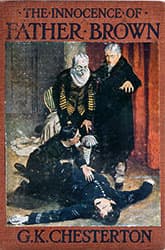The Innocence of Father Brown
Critique Quotes Text Father Brown at the movies
 First edition
First editionFirst publication
1911
Literature form
Story collection
Genres
Crime, mystery
Writing language
English
Author's country
England
Length
approx. 87,000 words

Father Brown (Walter Connelly) ponders mysteries of crime and romance in the 1934 film.
Struggling with the depths
Father Brown, Detective (1934): Film, 68 minutes; director Edward Sedgwick; writers Henry Myers, C. Gardner Sullivan; featuring Walter Connolly, Paul Lukas, Gertrude Michael, Robert Loraine
G.K. Chesterton's Father Brown is an elusive character for presentation on large and small screens as a practitioner of detection.
He's fiercely devout but he's also more clever, subtle and wise about the ways of the world than any police or private detective on the case. The solving of mysteries often comes quickly to him, based on a combination of observation, Sherlockian logic and intuitive knowledge of human hearts. But he is more interested in saving the souls of criminals and suspects.
Once he's figured out who did it, he seldom rushes to judgment and often gives the guilty party the chance to set things right on their own—leaving many a story's conclusion hanging.
But don't let this make you think he's soft or too kind. Despite his unimpressive stature and his modest demeanor, Father Brown is mentally as strong as the devil.
And just when you think you have his opinions figured, the little priest comes out with one of his paradoxical aphorisms, sounding more like Oscar Wilde and suggesting further unknown depths.
Adaptations for movies and television, starting with the 1934 Hollywood film, struggle with his contradictory nature—if they bother to capture it at all.
Cheery changes of heart
I suppose the title of Father Brown, Detective was supposed to intrigue audiences in its time. How could a priest be a modern sleuth?
The screenplay takes elements from several Father Brown stories, especially "The Flying Stars" and "The Blue Cross". In the patched together tale Father Brown meets the jewel thief Hercule Flambeau and the two fall into an odd relationship of being both friends and adversaries.
Of course, this being Hollywood, a romantic relationship plays a key role in Flambeau's reformation by the end of the film. (In Chesterton's writing, the thief and priest meet in "The Blue Cross" and Flambeau comes around to the side of the angels in "The Flying Stars" after several other encounters.)
Father Brown here, played by American character actor Walter Connelly, is a cuddly, warm-hearted fellow, while Flambeau (Paul Lukas) is a slick figure in a rascally 1930s leading-man mould. The thief's change of heart at this Father Brown's urging seems unlikely, even with a woman's love at issue.
This movie is all very light-hearted, cheerful even. Which reminds me of a quote from the little priest in another story: "Cheerfulness without humour is a very trying thing." Most of the humour in Father Brown, Detective is thin and corny indeed.
The liveliest, most entertaining scenes may be Inspector Valentine's bizarre chase of Brown and Flambeau across town—taken from "The Blue Cross", though the context has radically changed.
— Eric
Critique Quotes Text Father Brown at the movies
1934, 1974, 2013present

